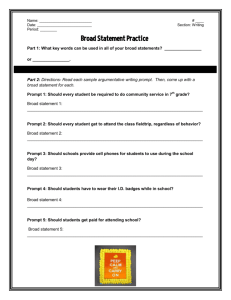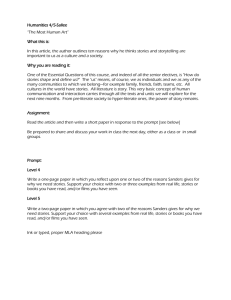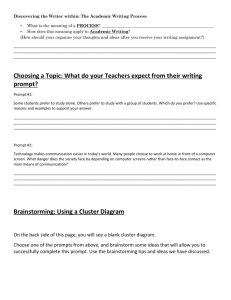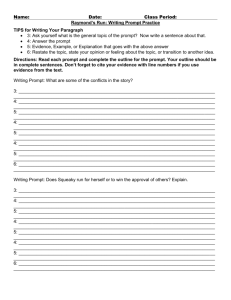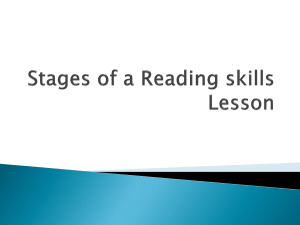Vocabulary Compositions
advertisement
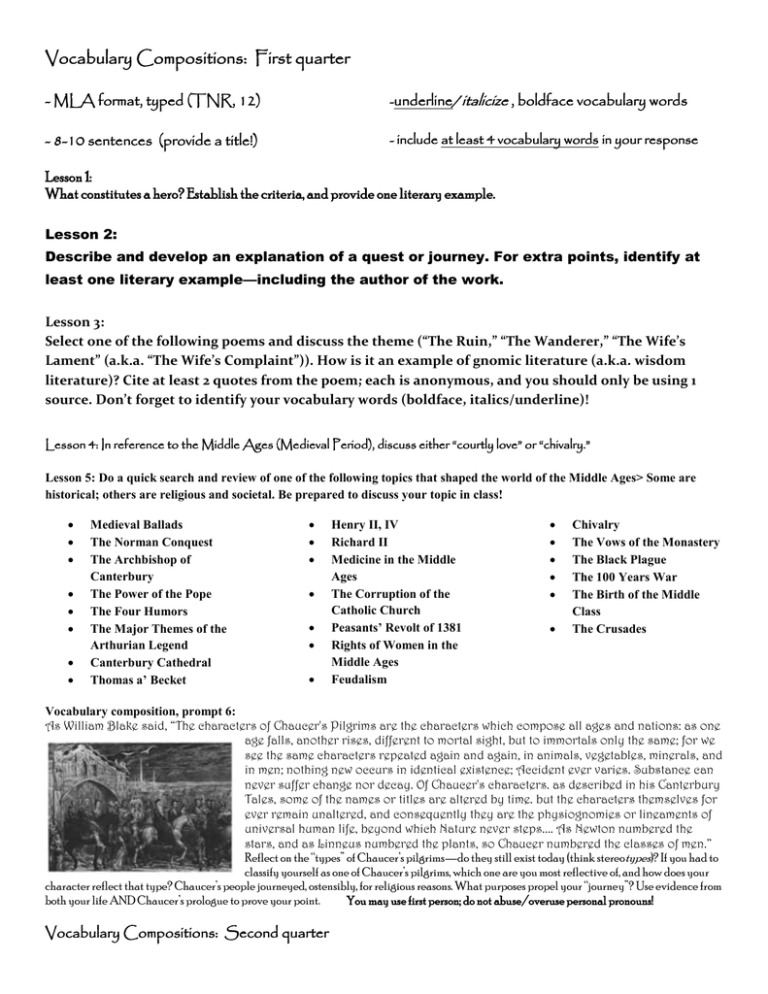
Vocabulary Compositions: First quarter - MLA format, typed (TNR, 12) -underline/italicize , boldface vocabulary words - 8-10 sentences (provide a title!) - include at least 4 vocabulary words in your response Lesson 1: What constitutes a hero? Establish the criteria, and provide one literary example. Lesson 2: Describe and develop an explanation of a quest or journey. For extra points, identify at least one literary example—including the author of the work. Lesson 3: Select one of the following poems and discuss the theme (“The Ruin,” “The Wanderer,” “The Wife’s Lament” (a.k.a. “The Wife’s Complaint”)). How is it an example of gnomic literature (a.k.a. wisdom literature)? Cite at least 2 quotes from the poem; each is anonymous, and you should only be using 1 source. Don’t forget to identify your vocabulary words (boldface, italics/underline)! Lesson 4: In reference to the Middle Ages (Medieval Period), discuss either “courtly love” or “chivalry.” Lesson 5: Do a quick search and review of one of the following topics that shaped the world of the Middle Ages> Some are historical; others are religious and societal. Be prepared to discuss your topic in class! Medieval Ballads The Norman Conquest The Archbishop of Canterbury The Power of the Pope The Four Humors The Major Themes of the Arthurian Legend Canterbury Cathedral Thomas a’ Becket Henry II, IV Richard II Medicine in the Middle Ages The Corruption of the Catholic Church Peasants’ Revolt of 1381 Rights of Women in the Middle Ages Feudalism Chivalry The Vows of the Monastery The Black Plague The 100 Years War The Birth of the Middle Class The Crusades Vocabulary composition, prompt 6: As William Blake said, “The characters of Chaucer's Pilgrims are the characters which compose all ages and nations: as one age falls, another rises, different to mortal sight, but to immortals only the same; for we see the same characters repeated again and again, in animals, vegetables, minerals, and in men; nothing new occurs in identical existence; Accident ever varies. Substance can never suffer change nor decay. Of Chaucer's characters. as described in his Canterbury Tales, some of the names or titles are altered by time. but the characters themselves for ever remain unaltered, and consequently they are the physiognomies or lineaments of universal human life, beyond which Nature never steps.... As Newton numbered the stars, and as Linneus numbered the plants, so Chaucer numbered the classes of men.” Reflect on the “types” of Chaucer’s pilgrims—do they still exist today (think stereotypes)? If you had to classify yourself as one of Chaucer’s pilgrims, which one are you most reflective of, and how does your character reflect that type? Chaucer’s people journeyed, ostensibly, for religious reasons. What purposes propel your “journey”? Use evidence from both your life AND Chaucer’s prologue to prove your point. You may use first person; do not abuse/overuse personal pronouns! Vocabulary Compositions: Second quarter - MLA format, typed (TNR, 12) -underline/italicize , boldface vocabulary words - 8-10 sentences (provide a title!) - include at least 4 words Vocabulary composition, prompt 7: The Renaissance was a time of enlightenment and renewal (rebirth), a time of change and progress, a time of the old and the new. Do a quick search and review of ONE of the following topics that shaped the Elizabethan world> Some are historical; others are religious and societal. Aside from your composition, be prepared to present and discuss your topic in class! Protestant Reformation Italian Renaissance Treaty of London Martin Luther (95 theses) Nicolaus Copernicus Henry VII Henry VIII Globe Theatre Chamberlain’s Men William Shakespeare Galileo Guy Fawkes Sea Dogs Elizabeth I Bloody Mary Francis Drake Roanoke Colony Sir Walter Raleigh Isaac Newton Christopher Marlowe Mystery Plays Miracle Plays Twelfth Night Candlemas Vocabulary composition, prompt 8: Select a William Shakespearean film adaptation. Discuss how and why Shakespeare’s literature is being presented (modern, contemporary, musical, theatrical, standard film. . . ). What is the key theme, and why are Shakespeare’s plays continuing to be reproduced? Vocabulary composition, prompt 9: Select one of the following and elaborate upon an example from literature/film: aside monologue soliloquy tragic hero paradox foil catharsis Lesson 10: Describe and develop an explanation of the theme “Carpé Diem” (This refers to the idea of Seize the day). **Lesson ** Select ONE composition from 7-10 and submit a revision. Vocabulary Compositions: Third quarter MLA format, typed (TNR, 12) 8-10 sentences (provide a title!) MUST include a work(s) cited for any include at least 4 different affixes for that week source(s) used and in-text citations within your integrate 1-2 quotes composition attach a copy of the source underline/italicize , boldface vocabulary words Vocabulary composition, prompt 11: What is something to “fight” for—worth the fight no matter the cost or consequence? Explain. ~Submit to Turnitin.com before Saturday, January 12th at midnight. Vocabulary composition, prompt 12: Donne says in “Meditation 17,” that “No man is an island.” Explain this quote and what Donne means by it, using both textual evidence and life experience. You may use first person—sparingly. Cite your textual evidence. ~ Submit to Turnitin.com before Saturday, January 19th at midnight. Vocabulary composition, prompt 13: Develop (through agreement or disputation) one of the following statements: ~ Submit to Turnitin.com before Saturday, January 26th at midnight. Courage is heroic Defiance is heroic Weakness is heroic Vocabulary composition, prompt 14: Jonathan Swift uses satire to flay the English for their societal practices. If he were alive today, what do you think he might satirize? What silly human behavior, practices, belief or attitude do you consider worthy of satire today? ~ Submit to Turnitin.com before Saturday, February 2nd at midnight. Vocabulary composition, prompt 15: Develop (through agreement or disputation) one of the following statements: ~ Submit to Turnitin.com before Saturday, February 9th at midnight. Only good characters can be depicted as heroes in works of literature. There is no nobility or respectability to be found in those who are evil or villainous. Both good and evil exist within all people and all characters. All literary heroes must experience a fall of some kind. Villains can possess heroic traits. Even the brightest can use their goodness for evil. Vocabulary composition, prompt 16: Select one of the following types of Odes. Clarify its distinction and purpose. What makes it unique? Horation Ode Pindaric Ode Anacreontic Ode Romantic Ode Vocabulary Compositions: Third-Fourth quarter MLA format, typed (TNR, 12) 8-10 sentences (provide a title!) MUST include a work(s) cited for any source(s) used and in-text citations within include at least 4 different affixes for that week your composition integrate 1-2 quotes underline/italicize , boldface vocabulary attach a copy of the source words Vocabulary composition, prompt 17: What is the purpose of the Byronic Hero persona in literature? Support your response with examples of his presence in literature/movies. Vocabulary composition, prompt 18: In 1834, a popular novelist, Edward Bulwer-Lytton purports “When Byron passed away, ... we turned to the actual and practical career of life: we awoke from the morbid, the dreaming, ‘the moonlight and dimness of the mind,’ and by a natural reaction addressed ourselves to the active and daily objects which lay before us.” The transition from Romantic to Victorian literature depicts economic, social, political, and philosophical shifts toward a utilitarian lifestyle—beyond a simple appreciation of life as it exists. Vocabulary composition, prompt 19: Create a Dramatic Monologue: (key example: Robert Browning) The character is speaking to an identifiable but silent listener at a dramatic moment in the speaker’s life. Circumstances surrounding the conversation are made clear by implication An insight into the character of the speaker often results Vocabulary composition, prompt 20: Clarify your opinion of media’s impact upon literature. Incorporate examples for support (you can address books, movies, special effects, computer graphics, traditions, interpretations, interest, appeal, literacy, technology, . . . ) you can take this in numerous directions!
